CONTENTS
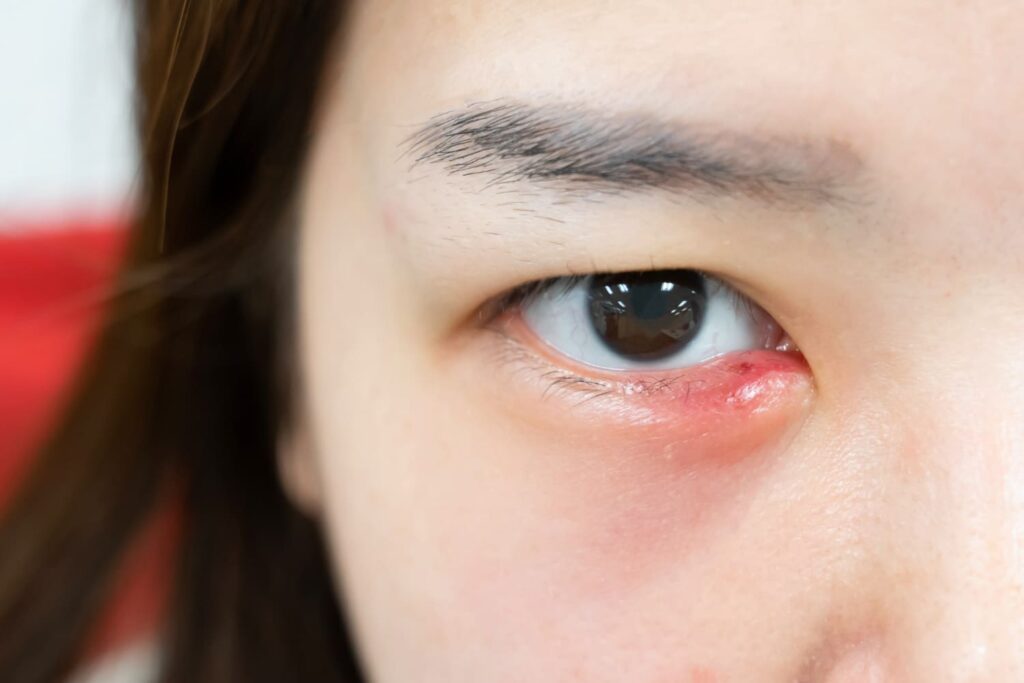
The Truth About Pimple on Eyelid
Having experienced a pimple on the eyelids, we can tell you firsthand how uncomfortable and frustrating it can be. Unfortunately, these annoying bumps are a common occurrence that can be caused by various factors.
Whether you’re dealing with a current eyelid pimple or looking to prevent future symptoms, it’s essential to savor the right information to care for your delicate eye area. Ahead, we’ll explore what causes pimples on eyelid, how to treat and prevent them, and when it’s time to seek medical attention. Read on!
What is a Pimple on the Eyelid?
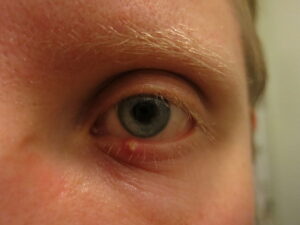
Pimple on eyelid, also known as a stye, is a common occurrence that happens when bacteria infects the hair follicle or oil gland on the eyelid. This infection causes a tender, red, and painful eye bump to form. This red, painful lump may resemble a pimple or boil.
Usually, a pimple on eyelid formed outside of the eyelid, close to the eyelid’s edge. While styes are not usually harmful to the eye, they can be uncomfortable and painful.
Cause of Pimple on the Eyelid
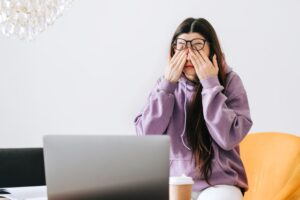
A pimple on eyelid, or stye, is caused by the bacteria staphylococcus. These typically found on the skin bacteria can enter the eyelids’ hair follicles or oil glands, leading to a blockage and, eventually, a bacterial infection.
Other factors that can contribute to developing a pimple on eyelid include poor hygiene, hormone imbalances, and rubbing of the eyes frequently.
People with certain pre-existing medical conditions, like rosacea or blepharitis, may also be more prone to developing a pimple on eyelid.
How To Treat Eyelid Bumps

While styes typically go away on their own after a few days or a week, there are several ways to help fasten the healing process and relieve discomfort.
First and foremost, do a DIY remedy by applying warm compresses to the stye area for 10-15 minutes several times a day. This helps ease pain and reduce inflammation.
Over-the-counter ointments and drops can be used to help relieve symptoms as well. When using ointments or drops, follow the instructions on the packaging carefully.
Your doctor may also prescribe oral antibiotics or other medication if your stye is particularly severe.
Prevention
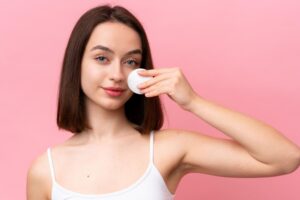
To avoid the discomfort of a stye, you can take preventive measures. Here are several tips and tricks on how to prevent a swollen bump on the eyelid:
- Always practice good hygiene by frequently washing your hands with water and soap.
- Avoid touching your eyes if you can.
- Don’t rub your eyes or eyelids excessively; this can cause irritation and potentially worsen the risk of developing a stye.
- Avoid sharing cosmetics, towels, or washcloths with others, as bacteria can easily spread through personal hygiene items.
- Check the expiration dates of cosmetics and dispose of any old products, especially mascara and eyeliner, which are known to harbor bacteria.
- Remove your makeup before bed to prevent makeup residue from entering your eyes while sleeping. You can use products like micellar water or face wash.
- Consider using the right product to incorporate eyelid hygiene as part of your daily routine.
- Manage any underlying health conditions, such as blepharitis or rosacea that may increase the risk of developing eyelid bumps.
Implementing these preventive measures can significantly reduce your risk of developing an uncomfortable eyelid cyst.
When To See a Doctor
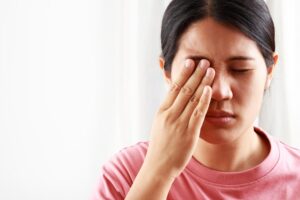
While styes are usually harmless and disappear within a few days, in some cases, you may need medical attention. Here are some symptoms of a stye that indicate you need to see a doctor:
- If the stye is particularly large, painful, or does not drain on its own,
- If the bump lasts longer than a week or becomes worse over time,
- If the stye begins to affect your vision or you experience eye pain, redness, or sensitivity to light,
- If you develop a fever or swelling in your face, this could be a sign of a more serious condition.
If these symptoms happen to you, visit your healthcare provider or eye doctor. If necessary, they can rule out any underlying medical conditions and provide treatment, such as antibiotics or drainage.
Frequently Asked Questions
Is it OK to pop a pimple on the eyelid?
Popping a pimple, or a stye, on the eyelid is not recommended. The area around the eye is very sensitive and can easily become infected. Popping the stye can cause the infection to spread and make the situation worse.
How long do eyelid pimples last?
Common eyelid bumps or pimples can go away on their own within two days to a week. In some cases, however, a stye may last longer than a week or become more severe, requiring medical attention.
What is the fastest way to treat a stye?
A stye can be cured through various methods, but one of the fastest treatments is to use warm compresses on the affected area for 10-15 minutes several times a day.
Conclusion
All in all, a pimple on eyelid or eye stye is a common occurrence, and treating it at home is completely fine as long as you take good care of the area using the right treatment steps. As always, if your eyelid bump worsens or its condition doesn’t improve after a couple of days, please contact a doctor.
Remember not to touch the lesion more than necessary and keep it clean with warm water compresses several times a day. Lastly, if you wear contact lenses, switch to glasses until your eye stye has healed properly. Styes can be uncomfortable yet treatable, but following our tips above can definitely make the process easier for you!


